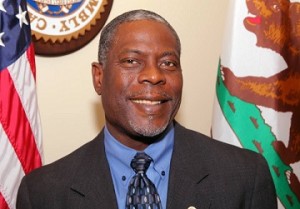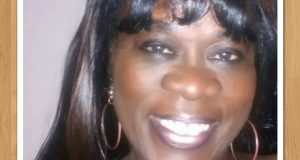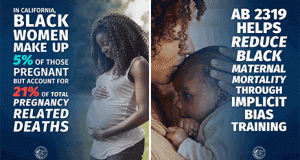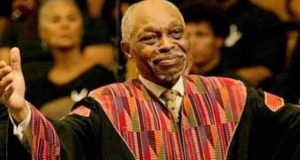By Jasmyne A. Cannick
After calling to order a standing room only crowd of democrats at the Winter meeting of the California Democratic Party’s African American Caucus, near San Francisco on the evening of November 18, longtime chair Darren Parker made a startling admission that he was battling stage 3 esophageal cancer.
Remarking that many in the room might have noticed his dramatic weight loss since their last meeting, Parker explained that two months ago he began to drop weight and was having issues with that he thought was just acid reflux and indigestion.
“What started as a simple doctor’s appointment to pinpoint the problem and find a solution has evolved into a diagnosis of stage 3 esophageal cancer,” he said.
Parker says that immediately after his diagnosis he began to withdraw and had begun to mope around until a colleague said to him, “Don’t cancer know they can’t kick your ass? Don’t cancer know that Parker can kick cancer’s ass?”
Parker credits those very words with putting the fight back into him.
“It brought me back to ‘I’m from Compton’,” he said. “I got in my car and I turned my music back up and I was back to myself because the news had really started to take me out of who I was. And because my friend said that, I was able to put back on my music and it helped to me to change my perspective back into who I was. Being here in San Francisco for the meeting of the African American Caucus was very important to me because it is part of the healing process more than the medication, more than anything else because I am finishing a journey that the Lord put me on originally. I think that’s the reason why I’ve been a Party officer for this long is that the Lord gave me a task and my task was to guide and build this Caucus into what it is today.”
Parker has been elected to chair the African American Caucus of the California Democratic Party for the past 10 years–5 consecutive terms. He served as an active member in the Communication Workers of America Union–including as their political director, during his 30-year career at AT&T. He has worked for three Assembly Speakers during his tenure, including John Perez, Toni Atkins and the current Speaker Anthony Rendon.
“When I became chair, there were literally ten of us in the room and five of us were officers,” Parker remembers. “It was Reggie Jones, who said to me that it was my time to step up. Little did I know that when I stepped up, that there wasn’t going to be any members and there wasn’t going to be any money. But he had been grooming us to make sure that at anytime we were ready to step up to the opportunity to serve, not just the Party, but to serve our people in the Party. So when I stepped up and saw that there were 10 people and $29.75 in the account, it inspired me to build as we’ve done my whole life.”
A longtime Antelope Valley resident by way of Compton, Parker says that he got his start in politics at the age of eleven with his brother and three cousins by starting a club in his grandmother’s house in Compton called One Hundred Thousand Students for the Freedom of South Africa.
“Very early in life, we were creating organizations in the backyard and had meetings about how do we help the students over there that we can’t see and can’t touch, but yet, want to be a part of stopping the struggle that they’re in.”
Parker says that his early organizing to help Black South African students was akin to the struggle he faced coming on as chair of the African American Caucus.
“I literally used the things that I had learned back then and in my adult life and which led to inspiration to build the Caucus one member at a time.”
Congresswoman Maxine Waters was a huge source of inspiration to Parker in his early days.
Remembering a Democratic Convention where Waters took the extraordinary step of calling a meeting of the African American Caucus during the middle of the convention on the floor, during session after no Blacks were on agenda.
“She did it for two reasons: One, that she had something to say and this wasn’t right and that we all knew it; and the second reason was to get the attention of the leadership of the state party.”
Parker says that Congresswoman Waters’ bold leadership during that convention showed him that when you have the power of delegates, you have the power of change in the Democratic Party.
“So not only did I go out to recruit African Americans but I went out to recruit delegates, because I figured if I had one-third or two-thirds of the delegates of the state party–and there’s 3,000 people–if I could get 1,500 or 2,000 people, we would ultimately have power no matter who is in charge or what was going on, because we could always pull our delegates in and make action happen.”
Today, the African American Caucus has over 1,300 delegate members under Parker’s leadership and is one of the largest member groups of the California Democratic Party. While he laments that not all of the members of the Caucus are Black, he does point out that the state party has not done a good job of reaching out to Blacks at the Assembly Democratic process level to get involved.
As word spread throughout California’s Black Democratic community, many offered words of praise for Parker and his leadership.
Los Angeles County Democratic Party Vice-Chair Bobbie Jean Anderson said, “This news is overwhelming for me;?I have known Darren and his mother for many years. In fact, he refers to me and Congresswoman Waters as his play moms because of our relationship with his mother and the impact we had on his life. He confided in me about politics and life in general. We have and still work together in Democratic politics. I am a strong supporter of him and he of me.
We have served together on the California Democratic Party’s African American Caucus under his outstanding leadership as chair and with the Los Angeles County Democratic Party, for more than twenty years. My prayer is for God’s intervention and healing power. I love and respect Darren to the utmost.”
“When I was in a black hole suffering from PTSD and ADHD and had just finished spending 13 months being incarcerated for a mistake I made–Darren Parker was the only person to physically take my hand and walk me up the steps of the State Capitol,” shared Basil Kimbrew “He said, ‘let’s do this,’ when no else would touch me or work with me back in the day.”
Kimbrew continued, “Because of that one day with Darren Parker, I am now where I am today–known as America’s Top Chef, feeding homeless veterans because I used to be homeless. Darren Parker made calls for me, got me back in the political game to where I am the largest political e-blast blogger going out to 43 million people every day. That’s what Darren Parker did for me. He helped me get my respect and dignity back”.
Parker maintains that the Caucus will continue on with it’s goals of getting more Blacks involved–including educating and encouraging Black Democrats in traditional and non-traditional Black areas on how to become a delegate.
“My biggest challenge now is making sure that the leaders who come behind me continue challenge the Party’s leadership and push back,” Parker reflects. “No one in a race can get elected without the vote of the African American community. No one can win a race without us. It’s time for us to exercise that. The siege that this country is under with 45 (President Donald Trump), if we are not consistent in standing up, we will be at the bottom of the totem pole when it comes to fixing things in our community based on what this one president can do with the power of the pen.”
The father of five daughters and a grandfather is facing a long road ahead of him, including chemotherapy, radiation and invasive surgery to move a portion of the tumor. A Go Fund Me account has been set up to help assist him with the costs of his cancer treatments at gofundme.com/DemsforDarren.
 Westside Story Newspaper – Online The News of The Empire – Sharing the Quest for Excellence
Westside Story Newspaper – Online The News of The Empire – Sharing the Quest for Excellence




